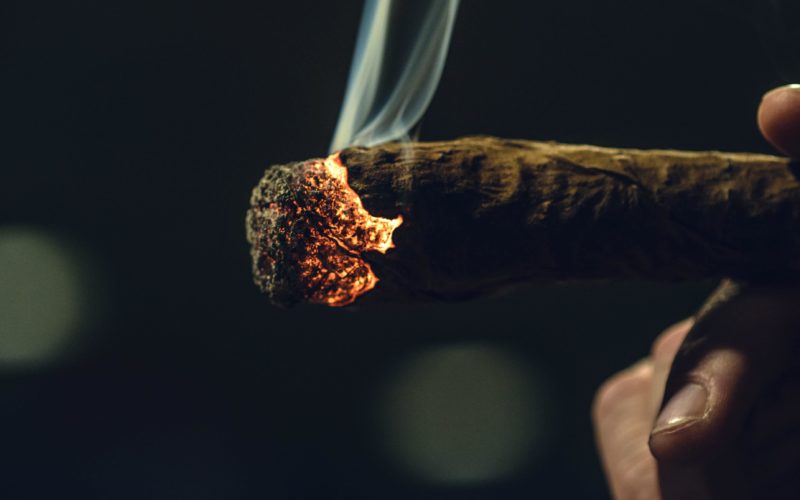Government
Nevada Regulators Give Final Approval for Cannabis Lounges

Although recreational pot is legal in Nevada, consumption is confined to individuals’ private residences. That’s about to change.
Regulators in Nevada on Tuesday gave the final sign-off to cannabis consumption lounges, paving the way for the establishments to perhaps open up by year’s end.
The state’s Cannabis Compliance Board voted on a slate of regulations for the lounges, a crucial regulatory hurdle in a process that has been nearly a year in the making.
According to local news station KLAS, some of the regulations approved by the board on Tuesday “included safety protocols at lounges, training requirements for staff, and location requirements for the lounges,” such as “certain distances from locations such as schools and community facilities.”
It was last August when Nevada lawmakers approved funding that had been requested by the Cannabis Compliance Board to hire staff and provide other support in the regulation of the lounges.
The Nevada Independent reported at the time that a legislative committee “unanimously approved three items that will provide the [Cannabis Compliance Board] with funds to hire more staff, work with the state attorney general’s office to hammer out regulations, and direct cannabis revenue toward education funding.”
Tyler Klimas, the executive director of the Cannabis Compliance Board, told the legislative committee at the time that the additional funding helped put the state on track to have the lounges open “at least the first quarter, or the first half of 2022.”
“Not only to see the lounges open, but then also the first part is where we would start to realize that revenue,” he said at the time.
Tuesday’s vote apparently keeps that timetable in place, with the Las Vegas Sun reporting that the board said the “first state-sanctioned cannabis consumption lounges could potentially open before the end of the year.”
It has been a long time coming for the Cannabis Compliance Board, which noted in a press release on Tuesday that it held 15 public meetings to go over potential regulations for the consumption lounges.
The board also provided details for prospective lounge owners.
“In addition to outlining the licensing and operation of consumption lounges, regulations approved today lay the groundwork for greater inclusion within Nevada’s cannabis industry,” the board said in the press release. “All applicants must submit a diversity plan, summarizing actionable steps and goals for meaningful inclusion. Additionally, half of the independent consumption lounge licenses in the initial round must be awarded to social equity applicants.”
“Prior to an open licensing period, the [Cannabis Compliance Board] plans to roll out tools and resources including worksheets, video tutorials and live webinars in order to ensure interested parties have access to the same information and are able to successfully submit an application,” the release continued. “The CCB expects to open the first licensing round for consumption lounges in the Fall, allowing for the first consumption lounges to open as early as the end of the year.”
Local news outlet KLAS reported that the Cannabis Compliance Board expects “40 to 45 applications for lounges attached to retail shops and 20 independent shops, 10 of which will go to social equity applicants.”
“What we are looking for is the impacts of drug policy on individuals and members of the community. We are looking at poverty level, we are looking at any past convictions of cannabis,” Klimas said, as quoted by KLAS.
Nevada legalized recreational cannabis use for adults back in 2017, but consumption has been confined to the private homes of individuals. That, of course, hasn’t stopped people from toking up in public. As The Street said, “while it is not technically legal to light up a joint while walking the Strip…the aroma in the air suggests that it’s happening quite regularly.”
Source: https://hightimes.com/news/nevada-regulators-give-final-approval-for-cannabis-lounges/
Business
New Mexico cannabis operator fined, loses license for alleged BioTrack fraud

New Mexico regulators fined a cannabis operator nearly $300,000 and revoked its license after the company allegedly created fake reports in the state’s traceability software.
The New Mexico Cannabis Control Division (CCD) accused marijuana manufacturer and retailer Golden Roots of 11 violations, according to Albuquerque Business First.
Golden Roots operates the The Cannabis Revolution Dispensary.
The majority of the violations are related to the Albuquerque company’s improper use of BioTrack, which has been New Mexico’s track-and-trace vendor since 2015.
The CCD alleges Golden Roots reported marijuana production only two months after it had received its vertically integrated license, according to Albuquerque Business First.
Because cannabis takes longer than two months to be cultivated, the CCD was suspicious of the report.
After inspecting the company’s premises, the CCD alleged Golden Roots reported cultivation, transportation and sales in BioTrack but wasn’t able to provide officers who inspected the site evidence that the operator was cultivating cannabis.
In April, the CCD revoked Golden Roots’ license and issued a $10,000 fine, according to the news outlet.
The company requested a hearing, which the regulator scheduled for Sept. 1.
At the hearing, the CCD testified that the company’s dried-cannabis weights in BioTrack were suspicious because they didn’t seem to accurately reflect how much weight marijuana loses as it dries.
Company employees also poorly accounted for why they were making adjustments in the system of up to 24 pounds of cannabis, making comments such as “bad” or “mistake” in the software, Albuquerque Business First reported.
Golden Roots was fined $298,972.05 – the amount regulators allege the company made selling products that weren’t properly accounted for in BioTrack.
The CCD has been cracking down on cannabis operators accused of selling products procured from out-of-state or not grown legally:
- Regulators alleged in August that Albuquerque dispensary Sawmill Sweet Leaf sold out-of-state products and didn’t have a license for extraction.
- Paradise Exotics Distro lost its license in July after regulators alleged the company sold products made in California.
Golden Roots was the first alleged rulebreaker in New Mexico to be asked to pay a large fine.
Source: https://mjbizdaily.com/new-mexico-cannabis-operator-fined-loses-license-for-alleged-biotrack-fraud/
Business
Marijuana companies suing US attorney general in federal prohibition challenge

Four marijuana companies, including a multistate operator, have filed a lawsuit against U.S. Attorney General Merrick Garland in which they allege the federal MJ prohibition under the Controlled Substances Act is no longer constitutional.
According to the complaint, filed Thursday in U.S. District Court in Massachusetts, retailer Canna Provisions, Treevit delivery service CEO Gyasi Sellers, cultivator Wiseacre Farm and MSO Verano Holdings Corp. are all harmed by “the federal government’s unconstitutional ban on cultivating, manufacturing, distributing, or possessing intrastate marijuana.”
Verano is headquartered in Chicago but has operations in Massachusetts; the other three operators are based in Massachusetts.
The lawsuit seeks a ruling that the “Controlled Substances Act is unconstitutional as applied to the intrastate cultivation, manufacture, possession, and distribution of marijuana pursuant to state law.”
The companies want the case to go before the U.S. Supreme Court.
They hired prominent law firm Boies Schiller Flexner to represent them.
The New York-based firm’s principal is David Boies, whose former clients include Microsoft, former presidential candidate Al Gore and Elizabeth Holmes’ disgraced startup Theranos.
Similar challenges to the federal Controlled Substances Act (CSA) have failed.
One such challenge led to a landmark Supreme Court decision in 2005.
In Gonzalez vs. Raich, the highest court in the United States ruled in a 6-3 decision that the commerce clause of the U.S. Constitution gave Congress the power to outlaw marijuana federally, even though state laws allow the cultivation and sale of cannabis.
In the 18 years since that ruling, 23 states and the District of Columbia have legalized adult-use marijuana and the federal government has allowed a multibillion-dollar cannabis industry to thrive.
Since both Congress and the U.S. Department of Justice, currently headed by Garland, have declined to intervene in state-licensed marijuana markets, the key facts that led to the Supreme Court’s 2005 ruling “no longer apply,” Boies said in a statement Thursday.
“The Supreme Court has since made clear that the federal government lacks the authority to regulate purely intrastate commerce,” Boies said.
“Moreover, the facts on which those precedents are based are no longer true.”
Verano President Darren Weiss said in a statement the company is “prepared to bring this case all the way to the Supreme Court in order to align federal law with how Congress has acted for years.”
While the Biden administration’s push to reschedule marijuana would help solve marijuana operators’ federal tax woes, neither rescheduling nor modest Congressional reforms such as the SAFER Banking Act “solve the fundamental issue,” Weiss added.
“The application of the CSA to lawful state-run cannabis business is an unconstitutional overreach on state sovereignty that has led to decades of harm, failed businesses, lost jobs, and unsafe working conditions.”
Business
Alabama to make another attempt Dec. 1 to award medical cannabis licenses

Alabama regulators are targeting Dec. 1 to award the first batch of medical cannabis business licenses after the agency’s first two attempts were scrapped because of scoring errors and litigation.
The first licenses will be awarded to individual cultivators, delivery providers, processors, dispensaries and state testing labs, according to the Alabama Medical Cannabis Commission (AMCC).
Then, on Dec. 12, the AMCC will award licenses for vertically integrated operations, a designation set primarily for multistate operators.
Licenses are expected to be handed out 28 days after they have been awarded, so MMJ production could begin in early January, according to the Alabama Daily News.
That means MMJ products could be available for patients around early March, an AMCC spokesperson told the media outlet.
Regulators initially awarded 21 business licenses in June, only to void them after applicants alleged inconsistencies with how the applications were scored.
Then, in August, the state awarded 24 different licenses – 19 went to June recipients – only to reverse themselves again and scratch those licenses after spurned applicants filed lawsuits.
A state judge dismissed a lawsuit filed by Chicago-based MSO Verano Holdings Corp., but another lawsuit is pending.
Source: https://mjbizdaily.com/alabama-plans-to-award-medical-cannabis-licenses-dec-1/
-

 Business2 years ago
Business2 years agoPot Odor Does Not Justify Probable Cause for Vehicle Searches, Minnesota Court Affirms
-

 Business2 years ago
Business2 years agoNew Mexico cannabis operator fined, loses license for alleged BioTrack fraud
-

 Business2 years ago
Business2 years agoAlabama to make another attempt Dec. 1 to award medical cannabis licenses
-

 Business2 years ago
Business2 years agoWashington State Pays Out $9.4 Million in Refunds Relating to Drug Convictions
-

 Business2 years ago
Business2 years agoMarijuana companies suing US attorney general in federal prohibition challenge
-

 Business2 years ago
Business2 years agoLegal Marijuana Handed A Nothing Burger From NY State
-

 Business2 years ago
Business2 years agoCan Cannabis Help Seasonal Depression
-

 Blogs2 years ago
Blogs2 years agoCannabis Art Is Flourishing On Etsy













